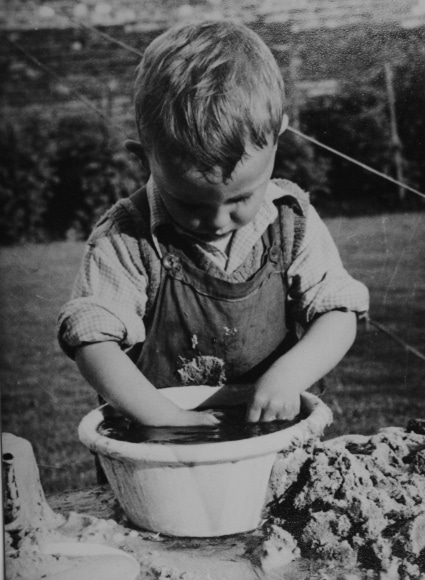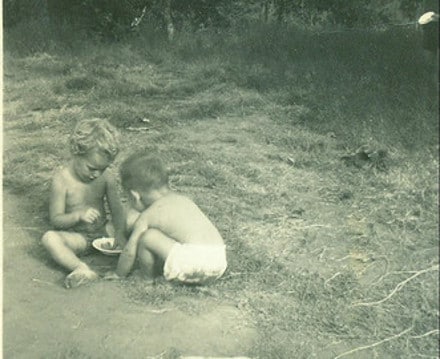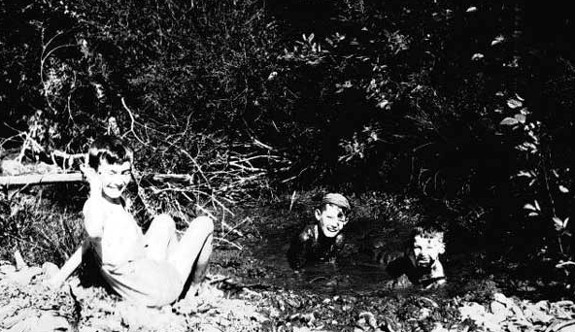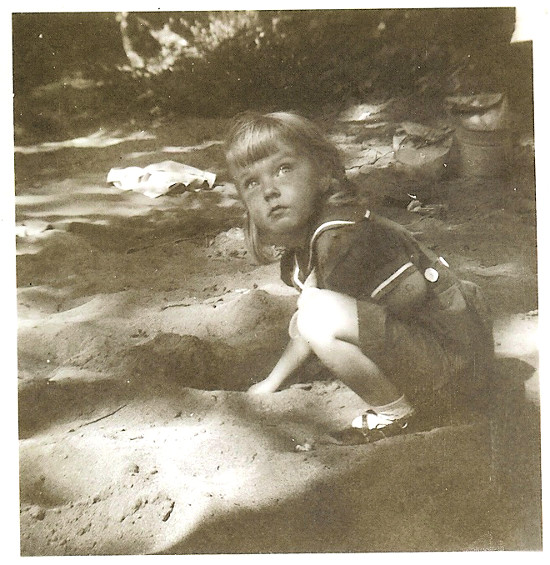
Editor’s note: This is a guest post from Ben Greenfield.
Did you eat your own boogers when you were a kid?
Well, it turns out we may in fact have an innate proclivity for ingesting this organic delicacy. Studies have shown that a kid’s snot actually harbors bacteria that, when eaten, helps to strengthen the body’s own natural immune system. Now don’t worry, that doesn’t mean that you need to harvest your kids’ boogers and feed the nuggets back to them, but it does highlight the fact that we need to let our kids get dirty.
I must admit: when my shiny new twin baby boys were brought into the world nearly six years ago, I certainly had my doubts about the value of letting their soft and innocent bodies roll, crawl, and toddle amongst the dirt and grime. But since then — especially after learning what I’m about to share with you — I’ve become extremely lax and my boys now clamber up and down farm animals near our house and elephants in developing countries, wallow like hogs in every mud puddle they find, and eat fistfuls of olives with faces and hands still stained from exploring every corner of the garage and backyard.
To understand why I’m not too concerned about germs, and why you shouldn’t be either, you need to grasp a concept called the hygiene hypothesis, along with two other important hypotheses. In a nutshell, these hypotheses hold that when exposure to parasites, bacteria, and viruses is limited early in life, children face a greater chance of having allergies, asthma, and other autoimmune diseases in adulthood. Let’s delve into these theories in a bit more detail.
3 Important Hypotheses

Although the idea that exposure to certain infections may decrease the risk of allergy is not new, Dr. David Strachan was one of the first to formally propose it as the “hygiene hypothesis” in scientific literature. In the paper, Strachan pointed out that the allergic diseases hay fever and eczema were less common in children from larger families because they were probably exposed to more germs through their siblings. Since then, epidemiological studies have confirmed the protective effect of not just large family size, but also of growing up on a farm.
Then, in a 2003 article in a journal of immunology, Dr. Graham Rook proposed the “old friends” hypothesis, arguing that the exposures necessary to increase immunity are not actually developed in childhood or during any other recently evolved infectious exposure, but instead are derived from microbes present since hunter-gatherer times, when the human immune system was evolving. Rook proposed that the microbes that co-evolved with mammalian immune systems are ancient, and that we have become so dependent on them that our immune systems can neither develop nor function properly without these internal microbes. These microbes include species that inhabit our skin, gut and respiratory tract, and the animals we live with; it also includes organisms such as symbiotic bacteria, viruses, and helminths (AKA parasites or worms) that establish chronic infections or carrier states that we can actually tolerate and that help us develop specific immunoregulatory responses.
Finally, in the past several years, the “microbial diversity” hypothesis has emerged, which holds that the health and diversity of the bacterial species in our gut mucosa is a key factor for strengthening the immune system. This makes sense, since Dr. Rook compared the embryonic immune system to a computer that contains many programs, but sparse data. During gestation and childhood exposure to diverse organisms, the immune system builds a “database” that allows it to identify and respond to harmful agents in the internal or external environment. This microbial diversity hypothesis is also why the vaginal delivery of babies is ideal — a newborn is exposed to a variety of beneficial bacterial species on its trip through the vaginal canal.
Each of these hypotheses is based on the general concept of upregulation of the body’s T cells in response to infectious agents — and appears to be well supported by epidemiological data. Many studies have proven that a variety of immunological and autoimmune diseases are much less common in developing countries than industrialized countries, and that immigrants to these industrialized nations develop immunological disorders such as asthma only upon arriving and spending a length of time in the new place.
Furthermore, while there’s no evidence to support the idea that reducing our modern practices of cleanliness and hygiene would have any impact on rates of chronic inflammatory and allergic disorders, there is a significant amount of evidence that our current habits actually increase the risk of infectious diseases!
Sure, not all germs are created equal, and there are definitely some situations in which you’d want to protect your kids. For example, if cases of MRSA (staph infections), rabies, measles, rotavirus, anthrax, or ebola were sweeping through your city, it’d be a good idea to keep the kids indoors and not kick them out to go sweat and blow snot with the other kids. But these type of situations are few and far between.
So hopefully you now understand that it’s no coincidence that in our modern era of antibiotics, antibacterial hand soap, bottle boiling, and daily bathing, we’re experiencing new and unparalleled occurrences of problems like autoimmunity, autism, ADD, food allergies, leaky gut, and obesity in our kids.
10 Ways To Get Dirty

Now that you understand the reasons why germ, bacteria, and even parasite exposure can be helpful for a child’s developing immune system, it’s time to delve into the nitty-gritty: how to actually get dirty! Even if your child wasn’t birthed via vaginal delivery there are plenty of other ways to get your kids “dirty.” Here are ten:
1. Let Your Children Taste Things – Although your natural reaction may be to slap that handful of leaves, patch of dirty grass, clump of mud, or slightly discolored snowball from your child’s exploring hands, resist the urge! The same goes for their propensity to gnaw on grocery shopping cart handles, lick random windows, and chew on the seat belts in the car. Allow your children to experiment touching, handling, and even tasting the natural world around them. My kids kiss our dog on the lips. When they were infants, I often watched them lick public bathroom floors at coffee shops, crawl through airports with their nose to the ground, and even rip their diapers off and eat their own poop. This may disgust you and make your parenting, care-taking heart want to leap out with an antibacterial wipe, but frankly, the pros outweigh the cons when it comes to your kids’ noses and mouths getting down and dirty with nature.
2. Don’t Be A Bottle Boiler – Sure, just like any other dishes, you’ll want to clean fluid and food residue from bottles (or pacifiers) every now and again via boiling or washing, but you don’t need to be a parent that nukes the pacifier every time it touches the carpet or boils the bottle nipple after the dog sniffs it. Your children can (and should) eat or drink from slightly germ-tainted surfaces every now and again.
3. Avoid Antibacterial Soaps – When I pick my kids up from child care at the YMCA health club, I sometimes get strange looks from the other parents, because I go out of my way to remind my kids not to use the antibacterial hand soap. By constantly using antibacterial soaps and hand sanitizers, we may not only be inadvertently inhibiting immune development in our children, but may also be creating “superbugs” or increasing bacterial resistance to pharmaceutical and natural antibiotics in some bacteria. So stick to good old soap and water, and even with these compounds, avoid excessive hand washing.
4. Avoid Antibiotics – Don’t rush out and grab a Z-Pack, an antiviral medication, or pump your kid full of antibiotics when they get a flu or become knocked down by a nasty bug. This can create similar bacterial resistance issues as antibacterial soaps. On the flip side, if your child is seriously down for the count with a flu, you may need to be worried about potential consequences such as pneumonia, bronchitis, or sinusitis. In this case, I recommend you look into natural ways to boost white blood cell count or introduce natural antiviral or antibacterial substances, such as astragalus, oregano, echinacea, goldenseal, and elderberry tinctures. (Read one of the best articles I’ve ever read on these natural immune boosters.)
5. Visit Farms and Have Pets – You don’t need to fly to Asia and play with monkeys and elephants to expose your children to beneficial worms and germs. Instead, just go on the occasional field trip to your local farm to pet the sheep or feed the horses. Pets count too; cats, dogs, gerbils, guinea pigs, and even fish can expose children to a variety of germs, bacteria, and other living organisms they might not otherwise encounter. In a modern era of virtual pets, consider being the parent who instead builds a backyard chicken coop or visits the pet store for the occasional birthday gift.
6. Increase Time With Other Kids – For the first several years of school, we homeschooled our twin boys, but we also went out of the way to put them into gymnastics, where they were able to tumble around on a slightly dirty floor or mat surrounded by other children. We also ensured frequent visits to the gym’s child care, as well as having them participate in basketball, tennis, and soccer. We also sent them to music camps, ski school, and a variety of extracurricular activities that exposed our young children to other kids’ sniffles, skin, and sweat.
7. Eat a Variety of Cultured Foods – For years I’ve told my wife that she needs to write a cookbook called Dirty Kitchen (good idea, eh?) – alluding to the amount of lactofermentation and use of bacterial cultures she uses during food prep. I love this title because it refers to the wide variety of “dirty” bacteria in foods, which includes natto, kimchi, kefir, pickles, yogurt, sauerkraut, rakfisk, poi, kombucha, and even chocolate. Remember that it’s variety that’s important – and simply feeding your child the same probiotic pill day after day is probably not going to be adequate stimulus for their immune system.
8. Play Outside – I wish this tip could go without saying, but the sad truth is that a great percentage of children spend more time indoors on their Wii, PlayStation, and Xbox than they do outdoors getting dirty. On any nice afternoon, we kick our kids out into the backyard to explore, and since they were tiny toddlers, they always return with dirt under their fingernails, mud around their noses and mouths, and weeds and wild grasses lodged in their clothes. These are all immune system boosters that far outweigh the inconvenience of having to wash dirty children. Of course, our kids have learned firsthand the ravages of itchy poison ivy (pro tip: learn how to identify poison ivy), the sharp stings of a hornet nest, and road rash from tricycle tricks and bike crashes, but these pros also outweigh the cons, and it’s okay to take pride in a dirty, cut-up kid sitting down to dinner at the dining room table. Which leads me to my next point…
9. Don’t Bathe/Shower Every Day – In our post-Victorian, cleanliness-obsessed culture, it can be tempting to give our children a daily warm bath, followed of course by a perfect hair-do and a color-coordinated outfit from The Gap. But sometimes it’s okay to let the dirt ferment on your child. In the summer, our boys often go two or three days getting dirty and playing outside without a bar of soap in sight – and while they get a bit stinky and stained, this is a fabulous stimulus for their immune system. Let those dirt and soil-based organisms thrive on your child’s skin!
10. Don’t Do Excessive Laundry Loads – Germs, dirt, and bacteria thrive on clothing. Prior to reading this article, you may have been tempted to take this as a sign to do a daily load of laundry for any of your child’s dirty items. And while you shouldn’t necessarily send your child to sports, school, and social events smelling or looking like a pigpen, it’s okay to give clothes a few good wears before laundering – in the same way that you don’t need to be constantly boiling bottles and pacifiers. Most of the time, it’s fine for kids to smell just a little bit like…kids.
Summary
While this list of ways to get your kids dirty is by no means comprehensive, hopefully it gets your wheels turning about exposing your children to (gasp!) pathogenic organisms – including bacteria, worms, parasites, germs, fungus, viruses, and even other sick kids or dirty animals. This may be one of the best favors you can do for your kids, and you’ll probably be giving them an advantage later in life, especially compared to children who grew up in a bubble. And who knows, your own immune system might benefit a bit too, and you’ll have one less reason to be grossed out when your little one sneezes in your face, coughs at the table, or tracks a trail of dirt into the house!
__________________________________
Ben Greenfield is an ex-bodybuilder, Ironman triathlete, Spartan racer, coach, speaker and author of the New York Times Bestseller Beyond Training: Mastering Endurance, Health and Life. In 2008, Ben was voted as NSCA’s Personal Trainer of the year and in 2013 was named by Greatist as one of the top 100 Most Influential People In Health And Fitness. Ben blogs and podcasts at www.BenGreenfieldFitness.com, and resides in Spokane, WA with his wife and twin boys.








